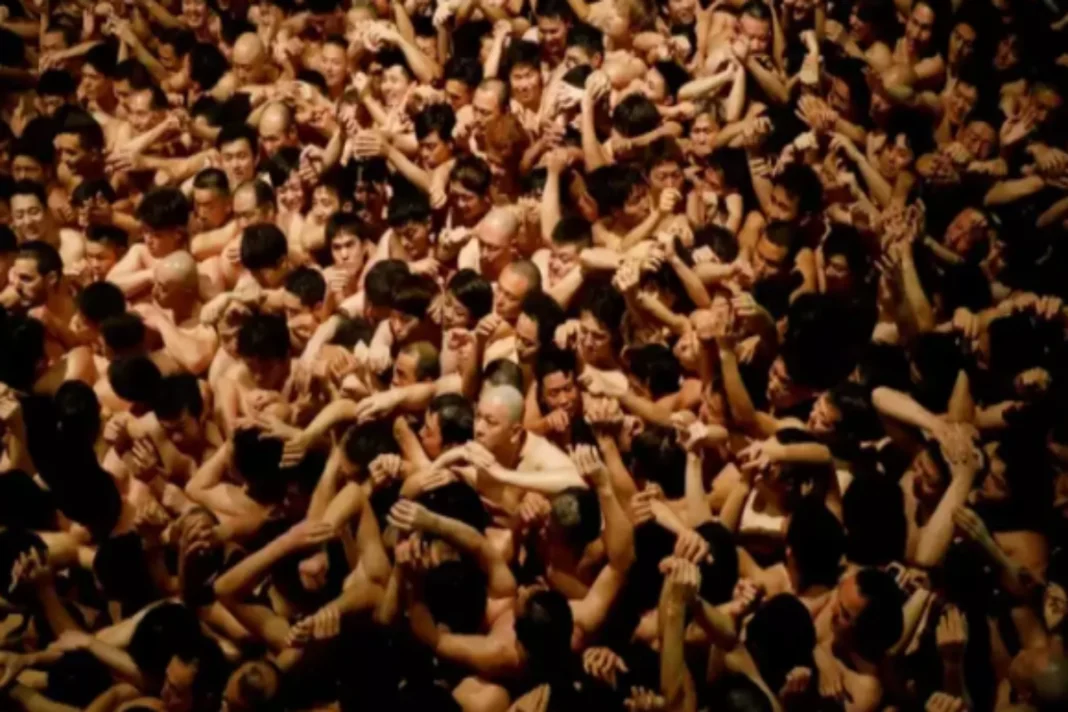Japan Naked Men: A thousand-year-old Japanese ritual came to an abrupt end as hundreds of nude men wrestled over a bag of wooden talismans, raising a cloud of sweat in the process. In the remote region of Iwate in northern Japan, the sequestered Kokuseki Temple has chosen to discontinue the popular annual event. Their fervent chanting of “jasso, joyasa” (meaning “evil, be gone”) resonated across a ceder forest.
Burden on Elderly Faithful
The elderly local faithful, who struggle to keep up with the ritual’s rigours, now bear a huge weight of organising the event, which annually attracts thousands of tourists and hundreds of participants. One of the oddest holidays in Japan, the “Sominsai” festival is the most recent custom to be negatively impacted by the nation’s ageing population crisis, which has particularly affected rural communities.
Daigo Fujinami’s Perspective
A resident monk at the temple that first opened in 729 named Daigo Fujinami said, “It is very difficult to organise a festival of this scale. “You can see what happened today –so many people are here and it’s all exciting. But behind the scenes, there are many rituals and so much work that have to be done.” He added, “I cannot be blind to the difficult reality.”
Japan’s Aging Society
Japan’s society has aged more quickly than that of the majority of other nations. Numerous businesses, services, and schools have been forced to close as a result of the trend, especially in small or rural regions.
The Sominsai festival at Kokuseki Temple used to last from the seventh day of Lunar New Year till the next morning. However, it was reduced to prayer rites and other minor rituals during the Covid epidemic. The last festival was scaled back, wrapping up at 11:00 p.m., although locals claimed it drew the largest attendance in recent memory.
Men’s Arrival in White Loincloths
Men in white loincloths arrived at the hilltop temple as the sun was setting, took a bath in a creek, and walked around the premises. They sang “jasso joyasa” as they tightened their fists against the chilly winter wind.
DON'T MISS
Numerous media crews trailed the men down the temple’s dirt walkways and stone steps while they were filming their experience with little cameras. Hundreds of men crammed inside the wooden temple as the celebration approached its peak, singing, shouting, and violently shoving over a sack of talismans.
Longtime Volunteer’s Hope for Tradition
A longtime volunteer at the event and a local who claimed the talismans, Toshiaki Kikuchi expressed his hope that the custom will be revived in the future. “Even under a different format, I hope to maintain this tradition,” he said after the festival. “There are many things that you can appreciate only if you take part.”
A lot of attendees and participants expressed their understanding as well as regret over the festival’s conclusion. “This magnificent celebration, which has lasted for a millennium, is coming to an end. I truly wanted to take part in this festival,” Osaka-based carer Yasuo Nishimura, 49, told AFP.
Evolution of Festivals Amidst Societal Changes
Similar festivals, in which men swim in icy water while dressed in loincloths or engage in combat over talismans, are still held at various temples throughout Japan. In order to survive, several festivals are modifying their regulations to reflect shifting democratic and societal values. For example, they are allowing women to participate in ceremonies that were previously exclusively for men.
Kokuseki Temple will continue its spiritual activities by holding prayer rituals and other events in place of the festival starting the following year. “Japan is facing a falling birthrate, ageing population, and lack of young people to continue various things,” Nishimura said. “Perhaps it is difficult to continue the same way as in the past.”
Keep watching our YouTube Channel ‘DNP INDIA’. Also, please subscribe and follow us on FACEBOOK, INSTAGRAM, and TWITTER



